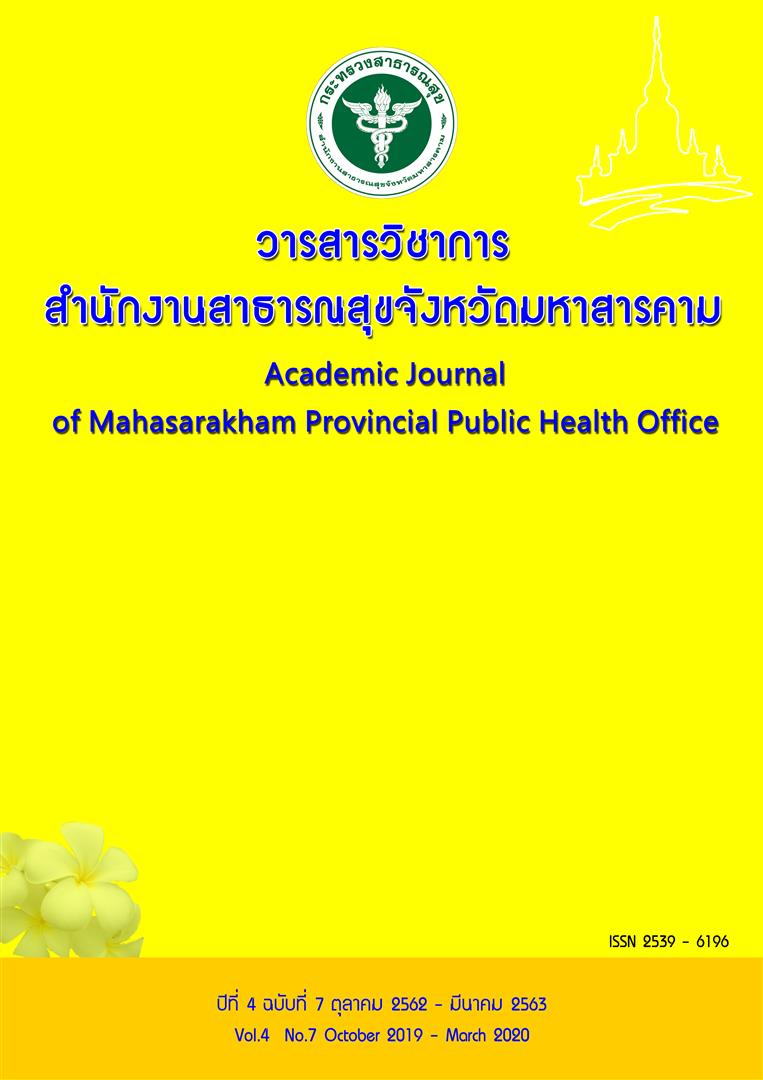การพัฒนารูปแบบการดูแลผู้ป่วยโรคไตวายระยะที่ 4 และ 5 โดยใช้การจัดการรายกรณี : กรณีศึกษา หอผู้ป่วยใน โรงพยาบาลเชียงยืน จังหวัดมหาสารคาม Development for Model the Care Person with renal disease stage 4 and 5 of Case Management: Case study of the ward at Chiangyuen Hospital, Maha Sarakham Province
บทคัดย่อ
Abstract
In Chiang Yuen District, the number of kidney disease patients is increasing continuously. In 2016-2018, there were 149, 192 and 201 kidney disease patients respectively. The problem of caring for the patients showed that the care model was not concrete. Causing the patients to come to readmit within 28 days with over-water conditions in the years 2016-2018, in the amount of 3,7 and 8, respectively.
Objective: To develop and study the outcomes of caring for patients with kidney disease stage 4 and 5 using case management.
Research Methodology: It is 4-stage action research, which is Phase 1, situation analysis, Phase 2, model development, Phase 3, experiments with model implementation, Phase 4, evaluation of model development. Purposive sampling 50 subjects consisting of 3 groups which were 10 multidisciplinary teams, 10 Registered nurses and 30 patients from stage 4 and 5 of renal disease. Group discussion guidelines Record form of the number of days to readmit the expense record, return within 28 days and satisfaction questionnaire for patients with renal disease stages 4 and 5 for the multidisciplinary team. And registered nurses with reliability at 0.97, 0.813 and 0.879, general data were analyzed using descriptive statistics. The satisfaction comparison for patients with renal disease stages 4 and 5 before and after the development was used by Pair T-test. The comparison of satisfaction for nurses and multidisciplinary teams before and after the development was done using the Wilcoxon signed Ranks Test.
Results: Phase 1 from the analysis of the situation of care for patients with renal disease stages 4 and 5, it was found that the practice of nursing care was not continuous. There are still errors in coordination with multidisciplinary professions. And still do not have joint solution activities. Phase 2 There is a team to develop a model for the treatment of renal disease patients stage 4 and 5 using case management. And establishing guidelines for hospital case management and registered nurses as a manager, working with a multidisciplinary team when taken to registered nurses 10 persons, found that everyone can follow the guidelines for the treatment of renal disease patients stage 4 and 5 using case management. Phase 3, when the care model was used with 30 patients, found That the number of days of a readmits of the sample before and after using different formats with a decrease in readmit days within 28 days of the sample before and after using different case management models and care of patients with renal disease stage 4 and 5 using case management. From the lower average before and after, it can actually reduce the cost of hospital inpatient care. Phase 4 Evaluation of the development of the model shows that registered nurses and patients with renal disease stages 4 and 5 are satisfied. The level of satisfaction towards the case management model before and after using the care model for patients with renal disease stages 4 and 5 was significantly different at the level of .05
Conclusion: The outcome of the development of a model of care for patients with renal disease stage 4 and 5 using this case-management to obtain a clear care model and concrete guidelines for working with multidisciplinary bodies
Keyword: Development case management model the renal failure disease patients with stage 4 and 5.


